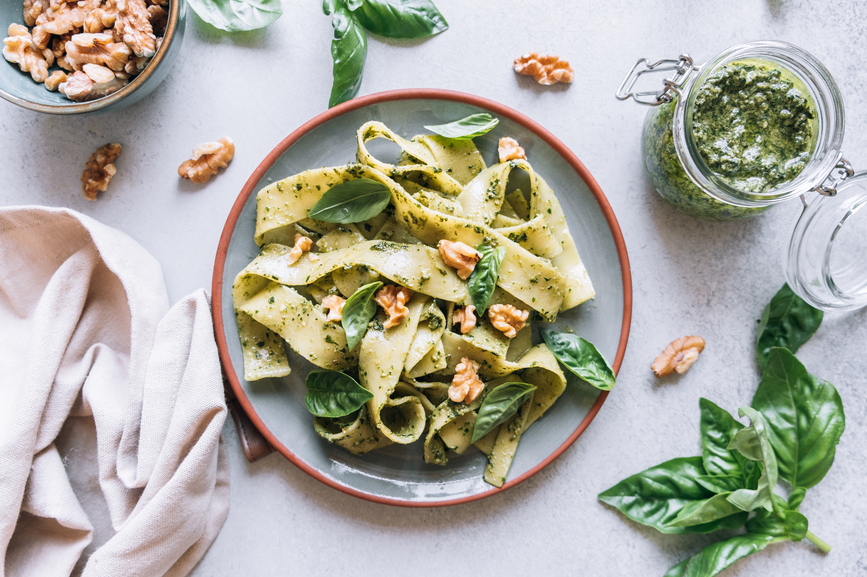While we’ll never underestimate the power of any solid midday nosh to give us a little extra pep in our step, research has shown that there are certain foods that contain compounds—such as tryptophan, which can boost serotonin levels; or gut-balancing probiotics, which are linked to lower levels of stress and anxiety—that have been shown to have a positive impact on your mood. Polyphenols are one such compound.
- Austin Perlmutter, MD, internal medicine doctor, author, and senior director of science and clinical innovation at Big Bold Health
Before we jump in, a quick caveat that should hopefully come as no surprise: There is no one food group or ingredient that’s going to turn your entire day around or make you feel like you’re walking on sunshine. (I mean, penne alla vodka comes pretty close, but still.)”We don’t believe that any one single food is going to boost your mood, but rather that a well-rounded diet based on whole foods that provides a wide range of nutrients is your best bet,” Jessica Beacom, RDN, previously told Well+Good.
However, science has shown that polyphenol-rich foods—including chocolate and coffee (god bless)—have been linked to boosting your mood and lowering levels of anxiety and depression, says internal medicine doctor Austin Perlmutter, MD. Here, we spoke with Dr. Perlmutter to get the inside scoop on exactly which polyphenol-rich foods have been shown to have said benefits.
How polyphenols can impact your mood
First things first: What are polyphenols, exactly?
“Polyphenols are plant compounds made up of a large and diverse group of molecules that help protect plants against stress, and research has shown that when humans eat them, they reap health benefits,” says Dr. Perlmutter. He also notes that scientific studies have confirmed a clear connection between diet, mood, and better mental health. For example, a 2018 study analyzing polyphenol intake and its effects on depression showed that those who ate more quercetin—a plant flavonol from the flavonoid group of polyphenols found in foods like fruits and grains—had reduced depressive symptoms.
Obviously we’re all wondering the same thing: What’s an easy way to start incorporating these foods into my diet to start reaping these health benefits? “Great ways to prioritize polyphenol-rich foods include adding plenty of colorful fruits and vegetables to your meals each day, using herbs and spices in your cooking, drinking tea and coffee—decaf or herbal if you have issues with caffeine—and simply subbing out low polyphenol foods for polyphenol-rich options,” Dr. Perlmutter says.
5 polyphenol-rich foods that can help boost your mood
1. Spices
“Per ounce, spices are among the top polyphenol-rich foods on earth,” Dr. Perlmutter says. Talk about a mic drop. One of his preferred go-tos is turmeric, also known for its superior anti-inflammatory properties. “Turmeric is especially notable because it’s the dietary source of curcumin, an orange polyphenol that helps give turmeric its distinctive color,” he says. “A number of studies have looked at curcumin’s role in brain and mental health, and some evidence suggests it could be effective due to its action on certain brain pathways in depression.”
If turmeric isn’t quite your jam, Dr. Perlmutter also recommends warm and sweet-tasting clove, which is among the richest sources of polyphenols of any food per ounce, and ideal for adding to your favorite dessert (or tea) recipe.
Here’s what a dietitian has to say about the many benefits of turmeric:
2. Dark Chocolate
We’ve got some good news for you, fam. Chocolate—more specifically, dark chocolate—has proudly made the cut on Dr. Perlmutter’s ‘foods high in polyphenols’ list. “Cocoa beans, which are used to make chocolate, are especially rich in polyphenols,” he says.
However, the doctor caveats that not all chocolate is created equal in terms of its mood-boosting benefits. “Dark chocolate—which uses more cocoa than milk or white chocolate—is generally richer in polyphenols because it has a higher cacao content. And unfortunately, if you’re eating chocolate with a lot of added sugar, you’re likely offsetting any potential health benefit,” Dr. Perlmutter says. To get the most benefits from your bar, he recommends dark chocolate with greater than 70 percent cacao and minimal added sugars.
3. Coffee
According to Dr. Perlmutter, coffee is among the top sources of polyphenols in our diets today. “Studies show that green or light roast coffee has the highest polyphenol concentration,” he says. He also encourages people to be moderate with added sugars when consuming this energy-boosting drink, which again may negate its health benefits.
4. Tea
Another polyphenol-rich drink that Dr. Perlmutter recommends is tea. Research suggests that green tea in particular may boast higher concentrations of polyphenols than other teas, particular herbal varieties that are missing out on the amino acid L-theanine. Aside from tea’s happiness-inducing capabilities, it’s also full of other healthful antioxidants which can help promote bone health as you age.
5. Buckwheat
“While it’s great to add additional servings of polyphenol foods into your diet, we can’t forget that for most people, the top source of calories every day is grains,” Dr. Perlmutter points out. “Most of the time, these grains have been heavily refined, so they’ve lost most of their polyphenols and other healthful nutrients.” To avoid such loss, Dr. Perlmutter recommends swapping all-purpose flour for buckwheat flour—he says he particularly loves Himalayan Tartary Buckwheat—because it’s so rich in polyphenols, as well as protein, fiber, magnesium, zinc, and B vitamins.
